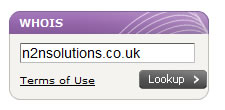Who owns your domain?
April 18, 2011
I had an interesting experience recently and one that reflects on the type of service you can get from a hosting provider if you’re not careful.
The premise was a relatively simple one. A web design agency had put a website into WordPress and quite frankly did a shocking job. Without going into too many details layout code had been put into the content which resulted in text being all over the place the minute you edited the text.
Fortunately, N2N were able to clear up these basic anomalies and redesigned the site to work correctly with WordPress. The client now has complete and proper control over the site and content.
Luckily the primary site domain was registered correctly with the customer but the problem came a few days ago when other sites associated with the domain were up for renewal.
How Much!
The client was asked if they wanted to renew 8 domains that had been purchased to work in conjunction with the main site. The initial figure quoted for renewing these domains was over £399.99…for just 8 domains!
Now it’s possible to get domain renewal for a reasonable cost these days. The excellent hosting provider we use, TSO Host, charge only £2.99 a year so I was somewhat taken aback. I mean, consider this, would you pay £50 for each domain if you can host ALL 8 domains elsewhere for 2 years!
Given the high price we decided to transfer the domains away from the existing hosting provider.
The Problem with Domain Registration
It’s at this point we discovered an issue. The existing provider had not correctly registered the domains to the user and so technically still they were the owners of the domain, not the client.
Now it’s normal business practice to perform due diligence but many small and independent businesses do not fully understand the process of domain registration. This is why they place their complete trust in a supplier.
So, consider this, how disappointed would you be if your trusted supplier wanted to charge the same rate for a simple domain transfer. Also, consider this, no hosting was required; we simply wanted to transfer to a different domain registrar.
To make matters worse, the hosted domains in question had never been associated with the primary website so were in effect useless. The only value they held was to stop someone else buying them.
And this was largely academic because the new website is already the top of page one for a key search phase.
Can I dispute the domain registration
It is possible to dispute the registrant name (the legal owner) but, consider this, is it worth the hassle. In our case it was pointless as these domain held absolutely no historic governance or authority.
Nonimet offer Dispute Resolution Service but this can be time consuming and reasonably costly for a small business.
How Can I check my Registration Details
The process is slightly different depending who the domain is registered with. The governing body of “.uk” Top Level Domains (TLD) domains is nominet. “.com” addresses are slightly more complicated but a quick check with an online WHOIS service and you’ll find out.
To check a “.co.uk” domain visit Nominet and perform the “whois” search on the page.
This will return all the registration details. In this example we can clearly see the registrant’s name.
Domain name: n2nsolutions.co.uk
Registrant: Neale Killick
Registrant type: UK Individual
Registrant's address: 4 Rainham Close Basingstoke
Registrar: Andrews & Arnold Limited [Tag = AAISP]
You can also see the name of the Registrar, the ISP that hosts the domain.
Conclusion
If you are not sure who looks after your domain then run a simple check WHOIS check on the internet. If the name is not what you expect then sort it out before it becomes too much of an issue.
After, consider this, would you want to lose control of your domain.


